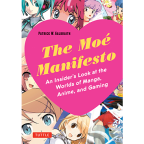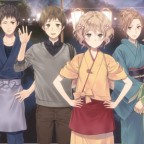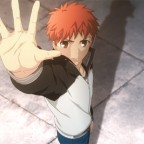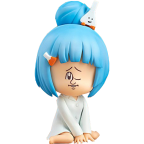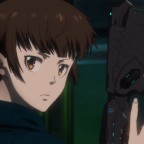Wolf Children Movie Review
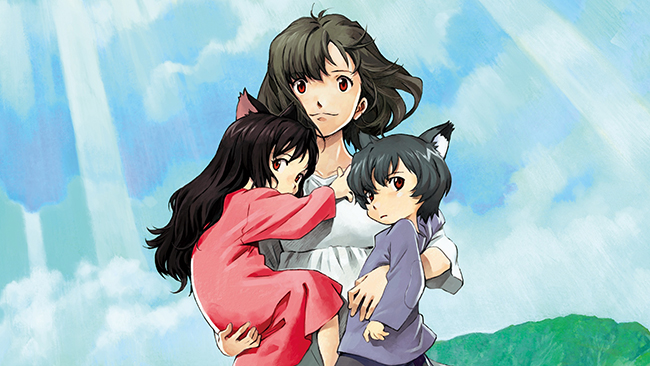
The Girl who Leapt Through Time and Summer Wars were two undeniable success stories back in their day. Coming from such a background director Hosoda Mamoru had a hefty reputation to uphold with his new movie, and I’m very happy to announce that Wolf Children upholds this reputation with ease.
Wolf Children (Ookami Kodomo no Ame to Yuki) begins with the courageous and eternality optimistic university student Hana. One day Hana is attracted to a new guy in her university and takes the initiative. What follows is a queer, yet sweet, love story. Later on Hana learns that her object of love is a werewolf – a half-human half-wolf capable of switching forms back and forth. Despite this fact Hana’s love for him is unshaken and the two eventually move in together and bear two children. Shortly afterwards the two’s romantic story comes to a abrupt end when the husband dies in an accident, leaving Hana alone to care for her two werewolf children – Ame and Yuki. She just lost her love, is dead broke and hasn’t a clue as to how to raise werewolf children. But all pales in comparison to a mothers love and so Hana pushes forward in the hopes of raising her two children as best as she possibly can.
The first thing that springs to mind after watching Wolf Children is how different it is compared to those two movies that came before it. Although all three were conceived by the same director Wolf Children is fundamentally different from The Girl Who Leapt Through Time and Summer Wars. The latter tells science fiction stories intertwined with hints of adolescence love. The former tells a fantasy story about the devotion of a loving mother and of two children who, from the get-to, are acutely aware that they are abnormal. By no means is Ame and Yuki’s childhood a harsh one though. The young family adapts to their daily life via trial and error and this is one of Wolf Children’s greatest charms. Ame and Yuki are adorable and their werewolf persona is cunningly used to make their cuteness stand out even more. They have their own unique personalities, with Ame being the introversive type and Yuki being the social cheerful type. As the children grow it becomes harder and harder to hide their secret while living in the city. So in a bold step Hana takes her two children and move to a remote village. There the three begin their new life in an altogether different atmosphere. Wolf Children shows the life in the village from a perspective that Summer Wars could not and in much more detail.
The three major aspects of this movie – maternal love, the struggle of the different, and life in the village – are meshed together into one indistinguishable touching family tale. This tale remains focused and affective despite building around these three, seemingly unrelated, notions. It’s hard to find any real flaw in Wolf Children’s storytelling considering how touching and subtle it manages to be. My only real criticism points to a fairly early scene in the movie in which Hana and her husband perform sex while he is in wolf form. This is one unnerving scene which many will deem unnecessary and in bad taste.
The way Wolf Children looks might also deter some viewers. This movie doesn’t look impressive, nor is it pretending to be a visual masterpiece either. The character designs are crude and are drawn in a minimalistic manner (perhaps on purpose). Shading – something that’s almost taken for granted in this day and age – isn’t used either so most characters have monotonously pale-white skin. The backgrounds are photographs that were digitally edited to look as if they were drawn (this technique will be familiar to those who saw Someday’s Dreamers and Tokyo Magnitude 8.0). The music isn’t the cream of the crop either. It is intentionally subtle and works great when used in context, but won’t wow anybody.
So Wolf Children might not win you over with its visuals or music. What Wolf Children does excel in is story and pacing. Clocking in at just shy of two hours the movie has just the right length to tell a story that spans many years. And that story moves at a relatively fast pace. Each period in Hana’s life has a different obstacle that she (and her children) must surpass, and when this obstacle is taken care of we move forward onto the next one. When things settle down the movie actively progress forward, usually with moody music and a few snippets that show how time passes by. Eventually Ame and Yuki reach their formative teen years and must decide which part of their personality will dictate their way of life – their human persona or their wolf persona. This struggle for identity is the peak of the movie and a result of their upbringing, their innate individualities and their surroundings.
Despite its subtlety Wolf Children is extremely tight in its presentation and deals with things in a satisfying manner from beginning to end. The fictitious nostalgia factor one might experience while watching Wolf Children’s take on village life carries some of that old Ghibli magic. Other aspects, such as the heavy focus on Hana and the fast pacing, are a much needed sidestep from the unrefined social norms current anime series keep shoving our way. These features inadvertently mean this movie is something you can definitely consider showing to those new to anime with relatively little risk. So If you crave for a touching family-oriented movie look no further than Wolf Children. And if you do decide to watch it, try doing so with your family. It is arguably more rewarding that way.


